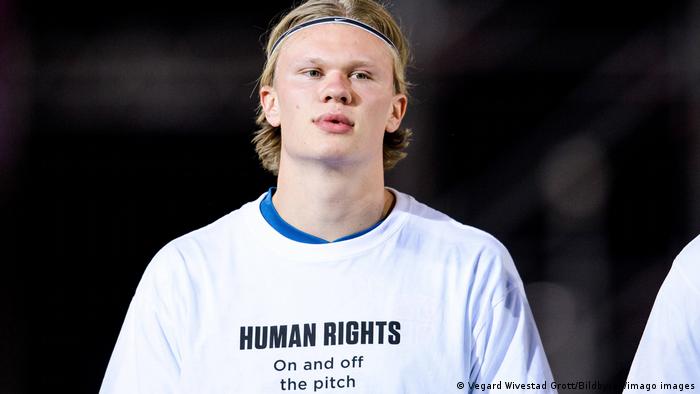Manchester City have reached a final deal in signing Norwegian striker Erling Haaland from Borussia Dortmund.
Erling Haaland, who once protested against the Qatar 2022 World Cup citing human rights abuses, will now start playing for a team owned by the United Arab Emirates.
Man City said in a statement: “Manchester City can confirm we have reached an agreement in principle with Borussia Dortmund for the transfer of striker Erling Haaland to the club on 1st July 2022.”
In March 2021, Norway ramped up their protests against human rights concerns in Qatar by wearing T-shirts with the slogan “Human rights – on and off the pitch” as they lined up for their game against Gibraltar.
At the time, there were discussions in Norway on whether the Norwegian Football Federation should boycott the 2022 World Cup in Qatar because of their concerns of what they described as unsafe working conditions for migrant workers and human rights issues.
The team did not make it past the World Cup qualifiers.
Since being purchased by the Abu Dhabi United Group (ADUG) in 2008, Manchester City has been accused of ‘financial doping’ after spending large sums of money to position themselves as one of Europe’s top clubs.
Sheikh Mansour, a member of the Abu Dhabi Royal Family and the UAE’s Minister of Presidential Affairs, owns ADUG.
Despite the fact that internal documents have been leaked that imply the Abu Dhabi government oversees ADUG’s finances and emails that purport to show the Gulf State arranging payments to Manchester City. However, the group has always maintained that it is separate.
Dubai’s dazzling skyline was built by migrant workers in the country. The UAE, like most of its neighbours, has implemented a number of measures in the last decade to improve migrant worker conditions. But critics argue they are not enough. However, the kafala system remains a major component of the state’s laws targeting them and has not been abolished yet.
The Saudi and UAE led war on Yemen has turned the country into the world’s worst humanitarian crisis, where more than 14 million people in Yemen, 80% of the population, are in acute need of humanitarian assistance.
The UN says the war has displaced more than three million people.
Social media reaction
Twitter users were quick to point out the hypocrisy of Haaland’s decision to join the UAE-owned team.
Labour issues and reforms in Qatar
Over the past few years, Qatar has seen a number of labour reforms. In 2021, the country introduced the region’s first ever non-discriminatory minimum wage law.
Additionally, Qatar approved two key laws in August 2020 to eliminate barriers on migrant workers leaving the country and changing jobs without permission from their employers.
The Amir removed limitations on migrant workers changing jobs without permission from their employers and established a monthly minimum wage of 1,000 QAR, including basic living allowances for select workers.
Under it, employers are now obliged to pay their workers allowances of 300 QAR for food, 500 QAR for housing, and a minimum monthly basic wage of 1,000 QAR.
Employers who fail to comply with the minimum wage law will face a one-year jail sentence and a 10,000 QAR fine.
The Ministry of Labour also launched a new platform for workers’ complaints in May 2021 to enable employees to submit public violations of the labour law.
The new laws have the potential to strike at the core of the Kafala system, which continues to link migrant workers to their employers, if effectively implemented. However, there are numerous cases of employers not abiding by the reforms.
Employees told Amnesty International that changing employment still comes with major obstacles and opposition from dissatisfied bosses.
More than 2,000 labour complaints were filed with the Ministry of Labour against firms and institutions across the country in December.
In recent months, there has been a slew of new complaints about working hours, compensation, and a variety of other issues.
Qatar’s Minister of Labour Ali Al Marri recently stated that the legislative updates and improvements in the labour sector in recent years have been ‘continuous and sustainable’ and will continue after the World Cup.







